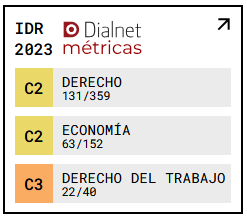Dependent Care in The European Union
Models, Trends and Challenges
DOI:
https://doi.org/10.18172/redsye.6166Keywords:
Long term care, care services, comparative study, trends, social expenditureAbstract
The objective of this article is to describe some of the main characteristics of the long term care models in Europe, and to analyze the elements that articulate these models in the different countries of the Union. The article also describes the trends of change that have been manifested in relation to the models of long term care in the continent, and emphasizes some of the challenges faced by these models. Among them, the need to adapt long term care services to the social investment paradigm and to the care crisis, making compatible to respond to the growing demand in this area with the necessary reorientation and recalibration of the Welfare States
Downloads
References
BETTIO, F. y VERASHCHAGINA, A., (2010). Long-Term Care for the elderly. Provisions and providers in 33 European countries. EGGE European Network of Experts on Employment and Gender Equality issues. Fondazione Giacomo Brodolini.
Atención a la Dependencia en la Unión Europea: Modelos, tendencias y retos
BONSANG, ERIC, (2009). Does informal care from children to their elderly parents substitute for formal care in Europe?, Journal of Health Economics, Elsevier, vol. 28 (1).
Comisión Europea (2016). Joint Report on Health Care and Long-Term Care Systems and Fiscal Sustainability. Volume 1. Economic and Financial Affairs Economic Policy Committee institutional paper, nº 37.
IBÁÑEZ, Z., LEÓN, M., (2014). Early childhood education and care provision in Spain. En: The transformation of care in European societies. Hampshire, Palgrave MacMillan.
KRAUS et al. (2010). A typology of long-term care systems in Europe, ENEPRI Research Report nº. 91.
LEÓN, M., RANCI, C. y ROSTGAARD, T., (2014). Pressures towards and within universalism: conceptualising change in care policy and discourse. En: The transformation of care in European societies. Hampshire, Palgrave MacMillan.
LIPSZYC, B., SAIL, E y XAVIER, A., (2012). Long-term care: need, use and expenditure in the EU-27. Economic Papers nº 469.
MARTÍNEZ BUJÁN, RAQUEL, (2010). Servicio doméstico y trabajo de cuidados. Hacia la privatización del cuidado familiar, Alternativas, 17, pp. 157-179.
MARTÍNEZ BUJÁN, RAQUEL; PÉREZ CARAMÉS, ANTÍA, (2013). Mujeres migrantes, trabajo de cuidados y servicio doméstico. Universidad de A Coruña, A Coruña.
NOGUEIRA, J., ZALAKAIN, J., (2015). La discriminación múltiple de las mujeres extranjeras que trabajan en servicios domésticos y de cuidados a dependientes en Euskadi. Zerbitzuan, nº 60.
RODRIGUES, R., HUBER, M. & LAMURA, G., (eds.) (2012). Facts and Figures on Healthy Ageing and Long-term Care. European Centre for Social Welfare Policy and Research: Vienna.
RODRÍGUEZ, G., MARBÁN, V., (2013). La atención a la dependencia en una perspectiva europea: de la asistencialización a la cuasi-universalización. En: Los Estados de bienestar en la encrucijada: políticas sociales en perspectiva comparada. Madrid, Editorial Tecnos.
SIIS Centro de Documentación y Estudios, (2011). Prestaciones económicas y otras fórmulas de asignación económica individual en los sistemas de atención a la dependencia. Panorama comparativo internacional. Diputación Foral de Gipuzkoa.
VAN HOOREN, F., (2014). Migrant care work in Europe: variety and institutional determinants. En: The transformation of care in European societies. Hampshire, Palgrave MacMillan.
Downloads
Published
How to Cite
Issue
Section
License

This work is licensed under a Creative Commons Attribution-NonCommercial-NoDerivatives 4.0 International License.











